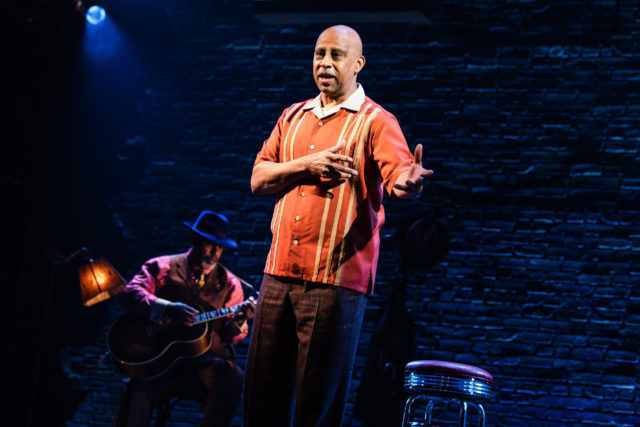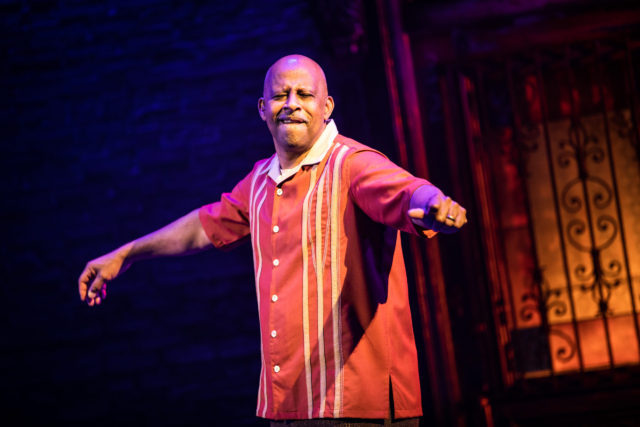
Ruben Santiago-Hudson shares childhood memories in Lackawanna Blues (photo © 2021 Marc J. Franklin)
LACKAWANNA BLUES
Samuel J. Friedman Theatre
261 West Forty-Seventh St. between Broadway & Eighth Ave.
Tuesday – Sunday through November 12, $59
www.manhattantheatreclub.com
In 2006, the HBO film of Lackawanna Blues earned John Papsidera an Emmy for Outstanding Casting for a Miniseries, Movie, or Special and S. Epatha Merkerson won an Emmy and a Golden Globe for her portrayal of Rachel “Nanny” Crosby. But in the Broadway debut of Ruben Santiago-Hudson’s one-man show, which premiered at the Public in 2001 and continues at Manhattan Theatre Club’s Samuel J. Friedman Theatre through November 12, Santiago-Hudson proves once again that he can do it all by himself.
In the ninety-minute play, Santiago-Hudson, serving as actor, writer, and director, portrays more than two dozen characters that were part of his childhood growing up in the steel town of Lackawanna in upstate New York, focusing on his five-year-old self and the woman left in charge of his care, the beloved Miss Rachel, also known to the tight-knit community as Nanny. Ruben’s mother had financial problems stemming from drug abuse, and his father did not live with them. Through the age of eleven, he often lived with Miss Rachel, who ran a pair of boardinghouses, one at 32 Wasson Ave., where young Ruben met such fanciful figures as Numb Finger Pete, Sweet Tooth Sam, Ol’ Po’ Carl, Small Paul, Mr. Lucious, Freddie Cobbs, and Mr. Lemuel Taylor; Santiago-Hudson embodies each of them with shifts in his voice and physical movement as he relates funny and poignant anecdotes about fishing, baseball, and domestic violence.

Ruben Santiago-Hudson shows off some sharp moves in Broadway debut of Lackawanna Blues (photo © 2021 Marc J. Franklin)
He wanders across Michael Carnahan’s intimate set, consisting of a few chairs, a small table, the front door of 32 Wasson Ave., a hanging window, and a back wall that evokes the boardinghouse, beautifully lit by Jen Schriever (with several cool surprises). Sitting in one corner is New York Blues Hall of Fame guitarist and Grammy nominee Junior Mack, playing music composed and originally performed onstage by Bill Sims Jr.; Mack previously performed in Sims’s band, so it is a natural hand-off. He interacts well with Santiago-Hudson, sometimes coming to the forefront, other times whispering under Santiago-Hudson’s dialogue. Occasionally, Santiago-Hudson whips out a harmonica and blasts away with verve. (The warm sound design is by Darron L West.)
Lackawanna Blues is a celebration of a town that was enjoying the fruits of prosperity, not a dirge about marginalized people suffering hard times. The play begins with Santiago-Hudson declaring, “Nineteen fifty-six. Lackawanna, New York, like all Great Lakes cities, was thriving! Jobs everywhere, money everywhere. Steel plants, grain mills, railroads, the docks. Everybody had a new car and a conk. Restaurants, bars, stores, everybody made money. The smell of fried fish, chicken, and pork chops floating in the air every weekend. In every bar the aroma of a newly tapped keg of Black Label, Iroquois, or Genesee beer, to complement that hot roast beef-on-weck with just a touch of horseradish. . . . You could get to town on a Monday and by Wednesday have more jobs than one man can take. These were fertile times.” There were problems, but the people knew how to take care of one another, with Miss Rachel at the center. “Nanny was like the government if it really worked,” Santiago-Hudson says.
Santiago-Hudson is no stranger to one-man shows; in 2013 at the Signature, he portrayed his mentor and friend, the late August Wilson, in How I Learned What I Learned. He has directed and/or starred in numerous Wilson works, winning a Tony for his role as Cantwell in Seven Guitars and earning a Drama Desk Award for directing Jitney and an Obie for helming The Piano Lesson. He won an Obie Special Citation for the original production of Lackawanna Blues, while Sims earned an Obie for his music.
On Broadway, Santiago-Hudson makes you think you see every character, smell every smell, witness minute details of every scene even though he never changes his costume or introduces props. It’s a compelling, deeply personal performance that feels right at home in the 622-capacity theater as he marvelously succeeds in inviting the audience into his past. When asked at a talkback about what happened to his mother, he said that would be a show unto itself while sharing some of the specifics of her tragic yet hope-filled life. Sounds like a heckuva sequel.